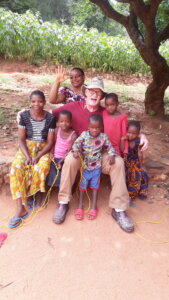 At 68 years of age, Rhode Islander Peter Bak found himself wondering what would come next. Retired after a successful career in business, he had spent three years making visits to nursing homes, hospitals, hospices, scout troops and more with Lucy, the first therapy-certified pit bull in the state. Still, Bak found himself looking for more.
At 68 years of age, Rhode Islander Peter Bak found himself wondering what would come next. Retired after a successful career in business, he had spent three years making visits to nursing homes, hospitals, hospices, scout troops and more with Lucy, the first therapy-certified pit bull in the state. Still, Bak found himself looking for more.
“What else can I do to give back? So many people have given so much to me: what else can I do?” he remembers asking himself.
When he expressed his quandary to the bishop’s staff, Bak was introduced to the Episcopal Volunteers in Mission program, part of the Mission Personnel Office of The Episcopal Church. He visited the church’s headquarters in New York while Elizabeth Boe, the Episcopal Church’s staff officer for global mission engagement, was in Tanzania, where the Rev. John Madinda, the principal of St. Philip’s Theological College expressed a need for someone to help people training for the priesthood learn more about how to maintain their churches. He also, he said, needed help maintaining the college’s building in Kongwa.
Bak didn’t need to be asked twice.
He began his ministry in Tanzania in 2018, making regular trips of two to three months each. Today his work still includes training future priests and work on the college’s building. But, he said with a laugh, he has learned that the most important skill is the ability to “always stay flexible,” since every day can include last minute surprises.
Bak’s work has expanded to connecting priests-in-training to the Bethesda Disability Program and teaching the school’s students how to use tools. Last year, he made a dozen cornhole games in Rhode Island and took them to Tanzania for the students in the Disability Program to paint.
His work in Tanzania is characterized by respect and love for the people he serves. “We mzungus (a term for white people in the Swahili language) are in their homeland and should be doing what they want,” Bak said. “I learned that the men especially liked my complimenting their work by calling it ‘supa.’ It caught on: ‘Supa work!’ Now, you can see groups of fifteen or twenty Tanzanian young men chanting ‘supa, supa, supa’ with a Boston accent.”
“Peter throws himself wholeheartedly into every experience,” Boe said. “He has built a great team at the theological college using his gifts of listening and responding to the situation at hand. He embodies what being a missionary in the 21st century is all about – building relationships, listening, learning, offering God-given skills.”
Bak is grateful to the Diocese of Rhode Island for support that has provided a new computer for the College’s top student and a new pump for the drip irrigation project. “Increasing the pump size has allowed us to grow more food.”
He encourages other Episcopalians to consider Episcopal Volunteers in Mission, a program for adults who are interested in living and serving in communities around the Anglican Communion.
“Don’t be afraid to do something new,” he said. “You may not have ever done it before, but that doesn’t matter – just be willing to learn. Before going to Tanzania, I hadn’t been out of the country except for trips to Canada. Going to Tanzania and learning to keep an open mind is a biggie. Just ask God for help to understand and work with the people there.”
Bak returned to Tanzania on October 3 and invites members of the diocese to follow his ministry on his blog. To learn more about Episcopal Volunteers in Mission, email Elizabeth Boe or fill out an online application.
